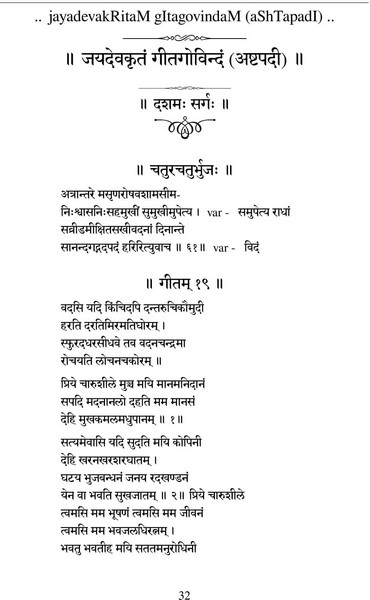
The original tunes of the ashtapadis are unknown and likely lost in history. In the twelfth century, Jayadeva's musical opera, Gita Govinda, reached Kerala and became quite popular under the name Ashtapadi Attam. Today, the ashtapadis are sung in a variety of tunes and the list below is just a sample of some of the raga scales used. The Prabandhas contain couplets grouped into eights, called ashtapadis. The lyrical poetry of the Gita Govinda is divided into twelve chapters, each of which is sub-divided into twenty four divisions called Prabandha. Alternate names Candana Carcita, Chandhana Charchitha Haririha Mugda, Harir iha Mugdha Context and meaning Lyrics Carnatic Renditions Sopana Sangeetam Renditions Hindustani Renditions Pop Renditions Updated Apr 2013 Context and Meaning Radha's friend continues her narrative from the previous ashtapadi. Ashtapadis are regularly performed at Kerala temples in the accompaniment of an idakka a genre of music called sopana sangeetham. Although the original tunes of the ashtapadis were lost in history, they remain popular and are widely sung in a variety of tunes, and used in classical dance performances, across India. It is also the source of the word ashtāpada, an Indian board game, the forerunner of chess. In the said verse above, Jayadeva Swami writes that Sri Krishna, in his pangs of separation from Radha, cries out to Radha to place her feet over his head. The literal meaning of ashtapathi, 'eight-steps', refers to the fact that each hymn is made of eight couplets (eight sets of two lines). Jayadeva Swamis Gita-Govindam is acclaimed by the learned to contain gems of insights into the mental workings of a true bhakta - and of his cravings of bhakti towards his lord. The ashtapadis, which describe the beauty of Lord Krishna and the love between Krishna and the gopis, are considered a masterpiece in esoteric spirituality and the theme of 'Divine romance'.



Ashtapadis or Ashtapadi refers to the Sanskrit hymns of the Gita Govinda, composed by Jayadeva in the 12th Century. umaapatidharaH Umaapatidhara, a contemporary poet of Jayadeva vaachaH pallavayati words, spreads uses words with prolixity and expansile meanings.


 0 kommentar(er)
0 kommentar(er)
